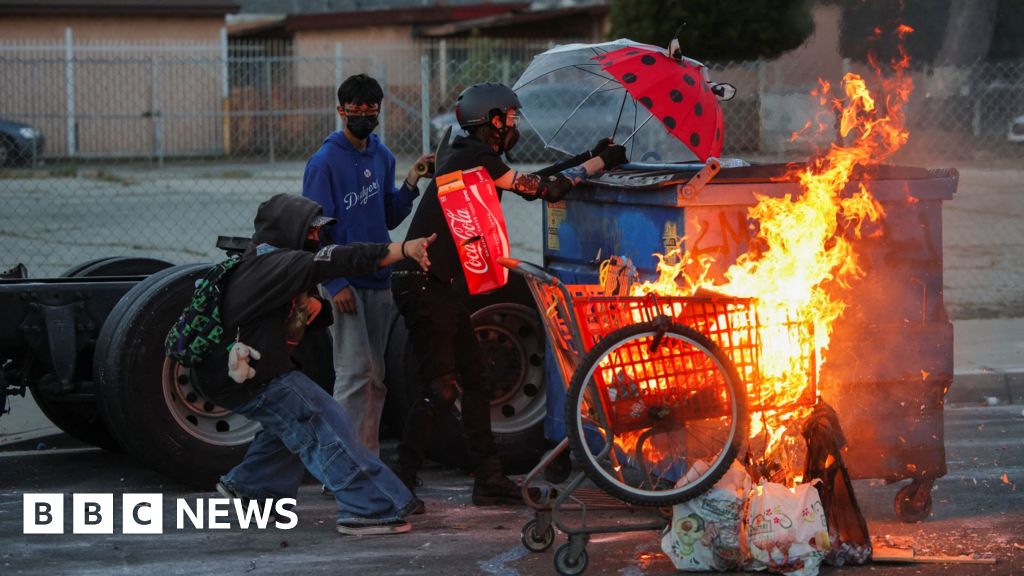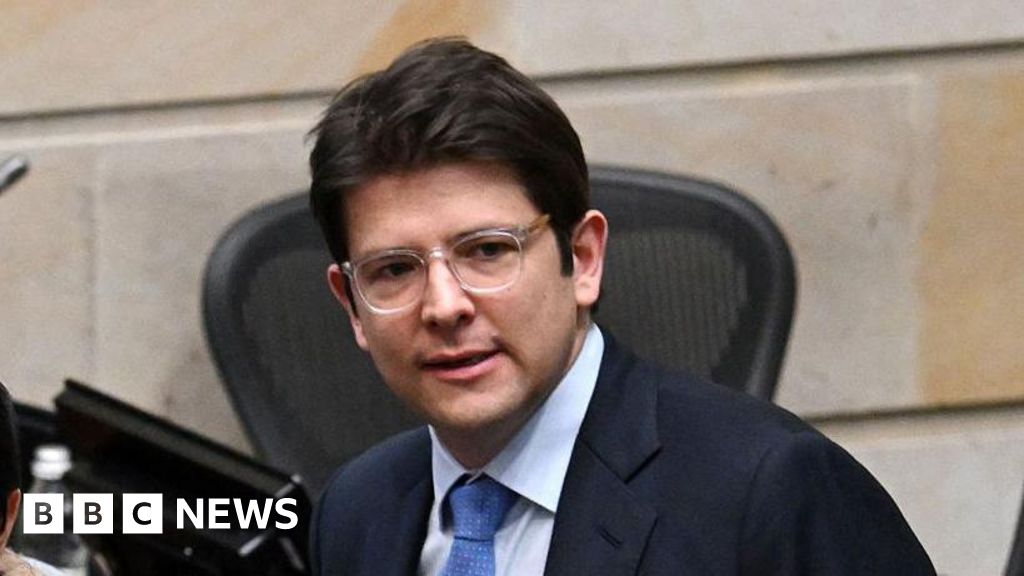ARTICLE AD BOX
By Angelica Casas and Chelsea Bailey
BBC News, Uvalde, Texas
Bible in hand as he approached the stage, Pastor Tony Gruben looked out onto a sea of shattered faces and paused. On Wednesday, less than 24 hours after one of America's deadliest school shootings, he admitted that he too, felt lost.
"I wanted to hope this was all a nightmare. I have no answers," he told a packed arena typically reserved for rodeos. "But when the morning breaks, God is there."
As he spoke, neighbours clutched one another - too lost in their grief to really care about the news cameras nearby broadcasting their pain.
Instead, they prayed for healing. They prayed for understanding. But most of all, they prayed for the souls of the 21 lives stolen from their community when an 18-year-old gunman opened fire at Robb Elementary School. Among the dead were 19 children between the ages of seven and 10.
Before last week, few could locate Uvalde, a small town of about 15,000 nestled between San Antonio and the US-Mexico border at the base of the Texas Hill Country. Now, its name has been added to a grim, yet growing, list of gun massacres in the United States.
And as the world grasps for answers, the people here cling to their faith.
"We may not understand what happened here yesterday, but we seek the Lord, as best we can," another minister said.
'I pray for their souls - and that boy too'
American flags, welcome signs and large crosses decorate front yards here. It's the kind of place where folks stop to help this journalist with a flat tyre, not caring how late they'll be to dinner, "because that's what I would want someone to do for my daughter."
And it's a town full of people willing to offer a half-smile, even in the midst of their grief.
Communities torn apart by mass shootings are often reduced to just a name: Columbine, Sandy Hook, Parkland. But where trauma transforms some into activists, the Uvalde community has turned inward.
As she left a mid-day mass, Irma Fuentes told the BBC she had spent the morning crying until she came to church. She said she prayed for the souls of the 19 children who were killed - and also for the soul of "that boy" who caused her community so much pain.
Irma prays for her community.
"The little girl that they found yesterday was my neighbour's granddaughter," she said, adding another neighbour's grandchild was still suffering from injuries in a San Antonio hospital. "I'm going home now to be with them."
But while everyone knows someone who lost a loved one in the shooting, it seems no one really knew the boy who pulled the trigger. Salvador Ramos bought two rifles a week before the shooting, authorities have said.
Classmates like Ivan Arrellano who, despite having shared classes and conversations with Ramos since they were 12 years old, back in eighth grade, couldn't show you a school photo of him because "he was never present for stuff like that."
Mickey Craddock, lives just three doors down from the home where the rampage began after the gunman shot his grandmother. She always thought of him as a "regular teenage kid." She'd sometimes see him play basketball, and heard rumours about his unstable relationship with his mother.
A mother holds up a photo of her child at the vigil.
"He was a troubled kid, and I could probably point out five or six of them in this community," Ms Craddock said. "People from bad backgrounds, drug backgrounds, you know, but we never thought anything like this would happen."
Some media reports have painted the gunman as a bullied and isolated teen, but Arrellano said his experience was different.
"He was not a victim of bullying. He would try to scare people and I guess this was his last way to scare people," he said.
We met 18-year-old Arellano two days before he was supposed to graduate high school. Now, because of the shooting, that milestone has been postponed, leaving the teenager to reflect on what he could have done.
"We knew he wasn't mentally healthy… we probably should've said something."
'It's hard to explain evil'
The morning after the shooting, the town was so silent you could hear a rooster crowing from blocks away.
Standing in her yard, Sandra Parra looked down the street towards Robb Elementary. On any other weekday, she'd overhear the voices of small children as they walked past her home towards the school. Sometimes there'd be singing, sometimes there'd be shouting, but there was always proof of life.
Monique holds son Joaquin close.
There was none of that Wednesday morning. Instead, her view of the school was obstructed by the hoards of media that swarmed the area - blocking roads and stomping through her neighbours' yards.
"The normality is not here anymore," Parra said. "They didn't deserve it and I just don't understand what happened."
Politicians and pundits have already rebooted a familiar playbook: reducing the town's trauma to a talking point about mental health and gun control.
But all of that is not up for debate in Uvalde - at least not right now.
On the day after the attack, once the initial shock of the shooting had passed, children returned to the school. Instead of backpacks and homework, they came bearing candles and flowers for classmates and friends they'd never see again.
"It's hard to explain to your kid that someone he used to play with won't be there anymore," said Monique, as she clutched her son, Joaquin, to her side. "It's hard to explain evil, it's hard for them to understand."
The Jimenez siblings were inside the school during the shooting.
Ameriah, 10, and Travis, 11, were both inside the school when shots rang out. As they approached their school, now encircled with caution tape, they told the BBC they knew to hide because they'd practised active shooter drills.
When police finally arrived, Travis had to climb over a chair and through a window to escape. Their father, Jesse Jimenez, said Ameriah was missing for four hours and he feared the worst. Finding her was a miracle.
Both kids spoke quietly, leaving their father to fill in any details.
"My son ran up to me and said he didn't think he was going to make it out - that he didn't think he was going to see me or his mother again," he said. "My daughter didn't know if it was a drill or if it was real."
The spectre of a school shooting has become so common in the United States, students across the country regularly practise how to respond to an active shooter. The Jimenez siblings said they were always told to "take them seriously".
"I know these kids practised," said JoAnn, a retired teacher who drove almost two hours to pay her respects. "It just really breaks my heart that they might not have been able to put into place what they had learned - turning off the lights, shutting the door, locking the door, not opening the door unless someone physically opens it with a key."
And it hurts more because this time of the year was meant to be celebratory, she adds. In the 32 years JoAnn spent teaching, she came to love the end of the school year, even if it meant saying goodbye to students.
"Towards the end of the year you have a little bond with your students. You have a little love there. You're with them a lot more than your own family sometimes."
'Ascension into Heaven'
On Thursday afternoon, the community was dealt yet another blow. Joe Garcia, the husband of slain teacher Irma Garcia, had suffered a fatal heart attack. The two had been high school sweethearts.
Earlier that day, Joe was seen taking flowers to a cross etched with his wife's name just outside the school. Now, his family says he died of a broken heart.
"I spent this afternoon with their family," Archbishop Gustavo Garcia-Siller said at the start of Mass that evening. "This is a tragic situation."
A boy carries a cross into mass
For the Catholics in this predominantly-Latino community, Thursday was meant to be an annual day of celebration marking the Feast of Ascension, when Jesus rose to Heaven to take his seat beside God, His Father.
Instead, at Sacred Heart Catholic Church, where the Garcias spent most Sundays, the congregation bowed their heads to mourn children and teachers who ascended too soon, leaving loved ones wracked with confusion and grief.
As he read from the Gospel, a church deacon reminded the congregation that before he departed, Jesus said, "You will grieve, but your grief will turn to joy."
This year, that verse is proving more difficult to understand.
After the spotlight fades and camera crews leave, the people in this all-American town will be left to rebuild after yet another distinctly American tragedy.

 3 years ago
43
3 years ago
43








 English (US) ·
English (US) ·